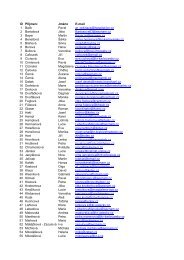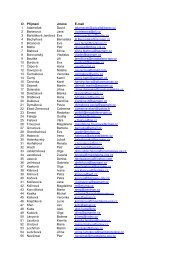Bonding Therapy (BP) and trauma
Bonding Therapy (BP) and trauma
Bonding Therapy (BP) and trauma
You also want an ePaper? Increase the reach of your titles
YUMPU automatically turns print PDFs into web optimized ePapers that Google loves.
<strong>Bonding</strong> <strong>Therapy</strong> (<strong>BP</strong>) <strong>and</strong> <strong>trauma</strong><br />
dr. Bogdan Polajner, psychologist<br />
<strong>Bonding</strong> psychotherapy fellow<br />
Work shop presentation<br />
VI. Conference about <strong>trauma</strong> <strong>and</strong> drug addiction<br />
Czechia, October, 2009<br />
.<br />
1
Abstract<br />
• <strong>BP</strong> in a group orieneted psychotherapy for persons with basic<br />
emotion disorders. It was founded by USA psychiatrist Dan Casriel<br />
<strong>and</strong> later developed by orher therapists. <strong>BP</strong> is in use in USA, EU,<br />
South America etc. There is World association of bonding<br />
psychotherapist, simmilar European association (ES<strong>BP</strong>) etc.<br />
• <strong>BP</strong> is well used in high treshold programms for drug addicts, expc.<br />
into TC's. <strong>BP</strong> can improve therapeutic work with patients in general;<br />
also can be used for making general therapeutic work deeper <strong>and</strong><br />
shorter.<br />
• From individual view, patients can with <strong>BP</strong> work on basic emotions<br />
problems, as well as on relation's <strong>and</strong> cognitive shema's.<br />
Key Words:<br />
• <strong>Bonding</strong> psychotherapy, basic emotions, drug addicts<br />
2
Content of presentation:<br />
• Short introduction of <strong>BP</strong><br />
• Relations beetween <strong>BP</strong>, <strong>trauma</strong> <strong>and</strong> TC<br />
• Slovene experience with <strong>BP</strong> groups<br />
3
About <strong>BP</strong> – short introduction:<br />
• “<strong>BP</strong> is a group therapeutic process for the<br />
treatment od disorders that are connected to<br />
a lack of fulfillment of the neurobiologically<br />
anchored psychosocial basic needs” (short<br />
definition; Stauss, 2005)<br />
• … for change through corrective emotional<br />
experiences<br />
• …not only for the reduction of symptoms, but<br />
also for increase joy <strong>and</strong> satisfaction in life<br />
4
Relations beetween <strong>BP</strong>, TC <strong>and</strong><br />
<strong>trauma</strong>:<br />
• <strong>BP</strong> has roots also in early TC movement (1960, Dan Casriel, Synanon, USA)<br />
• <strong>BP</strong> <strong>and</strong> TC are in service for high <strong>trauma</strong>tised persons (drug addicts,…).<br />
• <strong>BP</strong> <strong>and</strong> TC deals with the same typical emotional, personal, behavioral <strong>and</strong> family<br />
caracteristics of the clients <strong>and</strong> their <strong>trauma</strong>tic experiences:<br />
- early experiences with painfull rejections<br />
- feeling of “not exist”<br />
- intensive fear of rejection<br />
- lack of possibility to ask for help<br />
- lack of fullfiling of basic needs (expc. need for love)<br />
- basic untrust (<strong>and</strong> because of it high manipulative behavior)<br />
- basic emotional disorders<br />
- low contact with body sensations<br />
- relationship <strong>and</strong> atachment style disorders,<br />
- other basic “negative attitudes”, etc.<br />
5
Why to use <strong>BP</strong> into TC at all?<br />
• <strong>BP</strong> can create a significant + influence to TC’s<br />
clients through next general ways of help:<br />
- increasing th. process in general;<br />
- deepening of individual th. processes (TC can<br />
work with deep <strong>trauma</strong>s of clients <strong>and</strong> not<br />
just with behavior <strong>and</strong> outside symptoms);<br />
- shotrening of individual th. processes;<br />
6
Typical steps of <strong>BP</strong> (1-day) group<br />
session<br />
• (before: intake interviev, selection of clients, therapeutical<br />
plane, introduction seminar, starting feed-back,…)<br />
• Basic exercises for contact with basic emotions <strong>and</strong> body<br />
sensations (8.00-9.30)<br />
• <strong>Bonding</strong> exercises (mat work or other forms of “bonding”<br />
exp. for clients witch feels in clasical bonding to much<br />
closennes with others <strong>and</strong> to high tension) (10.00-11.30)<br />
• Attitude work in the circle (13.00-15.30)<br />
• Exercises for: pleasure, feeling of connection / belonging to<br />
the group, relaxsation, love (towards self <strong>and</strong> to others)<br />
(16.00 – 16.45)<br />
• Final feed back <strong>and</strong> individual plans for transfer <strong>BP</strong> work to<br />
everyday life (into TC, to home,…) (17.00-18.00)<br />
7
Typical steps of <strong>BP</strong> group session<br />
Emotional<br />
“worming up”<br />
eksercises<br />
<strong>Bonding</strong><br />
(mat work)<br />
Attitude work<br />
(in the circle)<br />
8
Basic emotions<br />
• Fear<br />
• Anger<br />
• Emotional pain (sorrow, sadness,…)<br />
• Pleasure<br />
• (short phase of emotional emptiness – time to<br />
decision or threath to stay trapped into pain)<br />
• Love<br />
9
Typical emotion dynamic through <strong>BP</strong><br />
fear<br />
anger<br />
Emot. pain<br />
Emot.<br />
emptiness<br />
Pleasure <strong>and</strong><br />
love<br />
“no<br />
emotions”<br />
10
Basic emotions through therapeutic<br />
phases*, related to TC<br />
(* if everything going well)<br />
Deep emotions are blocated (by using<br />
drugs etc), mechanisms of defence are<br />
high<br />
Fear<br />
Anger<br />
Emotional pain, sorrow, sadness,…<br />
Emotional pleasure, peace, love <strong>and</strong><br />
feeling “I’m OK / others are OK”<br />
Early Reeciving phase (before TC)<br />
late Reeciving phase, before <strong>and</strong> on<br />
begining of detox phase (before TC)<br />
Detox phase, early residential TC phase<br />
Middle of residentinal TC phase<br />
Late residentional TC phase<br />
Reentry phase (after TC)<br />
11
Basic positive attitudes<br />
The most basic attitudes:<br />
• I exsist<br />
• I need<br />
• I have the rihgt<br />
• I am lovable<br />
Other basic attitudes:<br />
• I’m worthy / I worth / I’m your equal<br />
• I’m not perfect, but I’m good enough<br />
• Me first<br />
• I’m responsabile (for my life,…)<br />
• I can choose<br />
• etc.<br />
12
1. basic positive attitude: “I exist”<br />
• Because <strong>trauma</strong>tic experiences drug addicts often feels:<br />
- I do not exist,<br />
- I do not have the right to be alive,…<br />
• Often two oposite ways of behavior if those negative<br />
att.:<br />
- too quiet, peacefool behavior, like he/she do not exist<br />
- violence, destructive, ackting-out behavioral,…<br />
• Charasteristics of those families: ab<strong>and</strong>onment or<br />
neglection towards child, devorced or addicted parents<br />
(parents are not able to take care for their kids)<br />
13
2. basic positive attitude: “I need”<br />
• Because <strong>trauma</strong>tic experiences drug addicts often<br />
feels:<br />
- I do not have needs<br />
- I may not ask for help<br />
- I should do everything on my own (me alone)<br />
• To much pain in early years to fullfeel the needs <strong>and</strong><br />
because of this low connection with own needs<br />
• Philosophy of those parents: “Who does everything<br />
alone, is worthy for three others”<br />
14
3. basic positive attitude:<br />
“I have the right”<br />
• Because <strong>trauma</strong>tic experiences drug addicts often<br />
feels:<br />
- I do not have the right<br />
- I may not dem<strong>and</strong> nothing for myselve<br />
- I do not deserve something good for me (I do not<br />
deserve a good life, a good future,…)<br />
• Families of those drug addicts often have low social<br />
perspective <strong>and</strong> low quality of life (often there is<br />
alcool problem already for generations in those<br />
families, etc.)<br />
15
4. basic positive attitude: “I’m lovable”<br />
• Because <strong>trauma</strong>tic experiences drug addicts often<br />
feels:<br />
- I must deserve love<br />
• Negative attitude is often connected with high sense<br />
of guilt<br />
• Families of those drug addicts often shows to<br />
children that they are lovable only if they behave<br />
good (they are not lovable because of them selves)<br />
• Too strict rooles are significant for those families<br />
16
Others basic positive attitudes:<br />
“I’m worthy / I’m your equal”<br />
• Because <strong>trauma</strong>tic experiences drug addicts often<br />
feels:<br />
- I’m not equal to others / I worth less than others<br />
• Those drug addicts have negative experience with<br />
reeciving attention (like kids they got attention only<br />
if they were sick,…)<br />
• Families often too critisyze to kids (“you are not for<br />
any use; you are worthless in school, at home,…)<br />
• These negative attitude often shows brothers <strong>and</strong><br />
sisters of drug addicts<br />
17
Others basic positive attitudes:<br />
I’m not perfect, but I’m good enough”<br />
• Because <strong>trauma</strong>tic experiences drug addicts often<br />
feels:<br />
- I need to be perfect,<br />
- Only the best is good enought from me,…<br />
• Those families often use “hermetic close”<br />
invironment for kids<br />
• Those parents often expect too much from kids<br />
(from emotional, psychological <strong>and</strong> also from<br />
physical wiev: “You need to be beautifool”)<br />
18
Others basic positive attitudes:<br />
I’m responsable (for my life)”<br />
• Because <strong>trauma</strong>tic experiences drug addicts often<br />
feels:<br />
- I’m not responsable for my own life (others<br />
decides,…)<br />
• Those families usualy takes over all responsabilites<br />
<strong>and</strong> always decide or work instead the child<br />
• Those families do not aprove that child can takes<br />
his/her own decisions, risks, experiences <strong>and</strong><br />
learning process also through mistakes,...<br />
• Those parents blocate child’s personal growth<br />
through decision making <strong>and</strong> responsabilites 19
Others basic positive attitudes:<br />
“I can choose”<br />
• Because <strong>trauma</strong>tic experiences drug addicts often<br />
feels:<br />
- I do not choose / decide about I realy want<br />
- I must decide like my parents, partner,… want(s)<br />
• Those drug addicts feels like they are “predeterminate”<br />
for all future life<br />
• Those families often (simmilar to negative attitude<br />
“I’m not responsabile”) takes over all decisions,<br />
plans, choises,… from kids<br />
• Blocate process of separation <strong>and</strong> individualisation<br />
20
Others basic positive attitudes:<br />
“Me first”<br />
• Because <strong>trauma</strong>tic experiences drug addicts often<br />
feels:<br />
- I belong to the very last place (beetween others)<br />
- All others are better than me<br />
- Others do, think, speak, deserve,… better than me<br />
• Those drug addicts allways speaks last on the group<br />
or – without support - prefere do not speak at all<br />
• Those parents ussualy used phrases towards kids:<br />
“You are small – so be quiet; you are stupid – let to<br />
the adult to speak,…”<br />
21
Some old Slovenian experiences with<br />
<strong>BP</strong> weekend-group work<br />
• Old practise of <strong>BP</strong> in TC before 5-10 years ago: 2-3<br />
days of intensive <strong>BP</strong> work (<strong>BP</strong> weekend) / 4 x / year:<br />
- to intensive emotional experience for clients<br />
- to much stress for clients<br />
- often drop out <strong>and</strong> acting-out behavior after <strong>BP</strong><br />
session<br />
- for clients too rarely (4x / year) to be able to connect<br />
one <strong>BP</strong> experience with the next one<br />
22
Some present Slovenian experience<br />
with 1-day <strong>BP</strong> group work<br />
• 1-day <strong>BP</strong> group / every 2 month or more often:<br />
- almost no acting out behavioral; no drop-outs of<br />
programme,… after <strong>BP</strong> session<br />
- clients can do a transfer of their own <strong>BP</strong> progress<br />
into their every day life<br />
• still open: how to even more increase feeling of love<br />
(not to feel just pleasure, without love / like it is<br />
typical for addicts…)<br />
23
Thank you for your attention!<br />
.<br />
24





